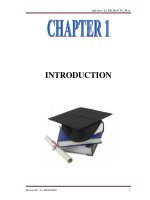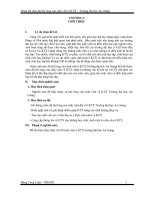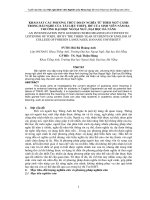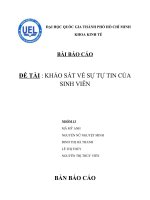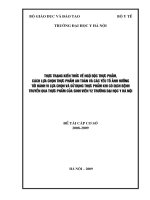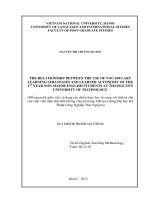Khảo sát về tính tự chủ của sinh viên chuyên ngữ trường Đại học Lạc Hồng
Bạn đang xem bản rút gọn của tài liệu. Xem và tải ngay bản đầy đủ của tài liệu tại đây (272.21 KB, 40 trang )
Advisor: Le Thi Bich Vy, M.A
Researcher: Le Thanh Binh
1
INTRODUCTION
Advisor: Le Thi Bich Vy, M.A
Researcher: Le Thanh Binh
2
1.1. BACKGROUND OF THE RESEARCH
Sinclair (2001) states that learner autonomy is also known as independent
learning. Those terms are interchangeable in educational dimension. Holec
(1981:3) defined learner autonomy as the “ability to take charge of one’s own
learning” and noted that this ability “is not inborn but must be acquired either by
natural means or by formal learning”. According to Fenner & Newby (2000),
autonomy in language learning is about people taking more control over the
purposes for which they learn languages and the ways in which they learn them.
These contentions are also right to the context of LHU. Students need to have
the ability of taking full responsibility for their own learning because most
English majors (over 52%) study for their future career, so they have to use their
language competence to work. In other words, to work well they need to have
real capability of English. Moreover, in order to study well at LHU, they need to
have good habits of self-study because of its syllabus that each subject has about
15 periods for self-study and know how to monitor their learning process and
progress.
1.2. RESEARCH PROBLEM
It is true that all of the students at twelve faculties of LHU are required to
learn English as a must for graduation. At almost faculties, students are
supposed to learn TOEIC 1, TOEIC 2 and TOEIC 3 as preparation for taking the
real TOEIC test of at least 450 scores as a must. For English majors, they have
their own syllabuses that focus on all of aspects concerning English such as
reading, speaking, writing, listening, pronunciation etc. and they are required to
get at least 750 scores of TOEIC test as one of the graduation requirements.
Underlying these view points, the research was conducted on those students who
have diverse settings primarily rural backgrounds where English is not much
popular and students have to study in teacher-centered environments which are
different from university. Those students were like ‘baby birds’ which stayed in
Advisor: Le Thi Bich Vy, M.A
Researcher: Le Thanh Binh
3
their nests and ate only what the ‘mother birds’ fed. This means that they were
mostly dependent on teachers and sat at their feet passively receiving what were
conveyed. For example, when teaching English, teachers often focused only on
grammar rules. They therefore had no chance to improve other skills such as
listening, speaking and writing. Those skills are very important because they are
needed for real communications and are also tested in any examination. Being
accustomed to learning attitudes and habits in the past, those students continued
their learning at university. Particularly, they learn by rote what the lecturers say
and stick to the textbooks only. In the survey the researcher found that most of
the English majors of autonomy is much lower than that the university expects
them to be of. They confessed that they expected much from teachers and
learned what the teachers told them to learn. At present, this method is no longer
suitable in university. Moreover, after four years studying English at Lac Hong
University (LHU), the researcher realized the reality that the number of English
majors that could really use their English was comparatively limited. Actually,
students who study independently are able not only to take more responsibility
for their own learning but also to evaluate and monitor their learning process
and progress (Holec, 1981). In addition, they have the capability to make better-
informed decisions on what and how they learn best and to select methods and
techniques to be used (Fenner & Newby, 2000). The above reasons have
prodded the researcher to carry out this study in order to get insight into the
issue with the hope of helping English majors realize the importance of
independent learning and take advantages of it.
Advisor: Le Thi Bich Vy, M.A
Researcher: Le Thanh Binh
4
1.3. JUSTIFICATION OF THE RESEARCH
Learner autonomy is the current educational trend in most universities in
the world, especially in Western countries (Hideo KOJIMA, 2006). Many
researches were done on independent learning as well as on how to promote it,
which considerably affects students’ study and their lives when they expose to
the real life. As most aspects of our daily lives are likely to undergo profound
changes, independent learning will enable individuals to respond to the changing
demands of work, family and society. Like guardians of the future, today’s
youth require the independent learning abilities that will empower them to act in
accordance with the principle of social justice and for the survival of our planet.
To some extent, the success of learning activity is contingent upon learners’
stance towards the World and the learning activity in particular, their sense of
self, and their desire to learn (Benson & Voller, 1997: 134-136). As a result, the
research was done with the hope of raising English majors’ awareness of
independent learning in order for them to become independent and lifelong
learners as well as responsible students so that one more time they can firmly
decide on exactly what they intend to achieve at the university and strive for it .
They may be more motivated, thus, take more responsibility for their own
learning and adjust as well as change their learning attitudes how to be
appropriate to the syllabus so as to meet their own learning needs.
Moreover, independent learning cannot be achieved in isolation.
Independent learning is an interactive process among students and between
students and teachers. Interaction between peers may include describing,
explaining, questioning, discussing, defending, encouraging, supporting and
assessing each other’s work (Ralph, 1998, p. 145). This contention shows that
they, students and teachers, students and students, are interdependent. For
students, they need to have teachers’ help to improve on learning skills and
knowledge. For teachers, they need the actively participation of students and
Advisor: Le Thi Bich Vy, M.A
Researcher: Le Thanh Binh
5
their own ideas to improve on the teaching methods. Supporting this view,
Cathy Dantec & Judy Jowers (2007, p.2) say that “Independent learning does
not mean working on your own.” In a sense, when students and teachers admit
that they are interdependent, they are more willing to cooperate with one
another. Also, once they recognize the importance of independent learning and
understand well what it is and how to accomplish it, they easily acquire it. And
once they possess the independent learning skill, they may become excellent
students and teachers. As a result, the research purpose is to help students realize
that it is necessary for them to actively participate in the classroom activities if
they want to be good students at university.
1.4. RESEARCH QUESTIONS
With the best effort the researcher is in hope of answering the three
following questions:
1. How much can the English majors of Lac Hong University be aware of
the importance of independent learning?
2.
What are the possible causes of their lack of autonomy and suggested
solutions to the problems?
3. What does the lack of autonomy affect students’ learning?
1.5. DEFINITION OF THE KEY TERMS
The term of learner autonomy is a fairly complicated notion to
explain exactly what it is. Most explanations of autonomy are subjective
depending on the different purposes of researchers in various fields. The ideas of
autonomy originally result from the radically student-centered educational
thought of writers such as Dewey (1916), Freire (1970), Illich (1971), and
Rogers (1969); In work on adult self-directed learning by writers such as
Brookfield (1986), Candy (1991), Knowles (1975), and Tough (1971). Learner
Advisor: Le Thi Bich Vy, M.A
Researcher: Le Thanh Binh
6
autonomy is also known by a number of other terms such as lifelong learning,
learning to learn, thinking skills and independent learning (Sinclair, 2001).
According to Benson & Voller (1997: 2), on general note, the term of autonomy
has been used in at least five ways:
• for situations in which learners study entirely on their own;
• for a set of skills which can be learned and applied in self-directed
learning;
• for an inborn capacity which is suppressed by institutional education;
• for the exercise of learners’ responsibility for their own learning;
• for the right of learners to determine the direction of their own learning.
Advisor: Le Thi Bich Vy, M.A
Researcher: Le Thanh Binh
7
LITERATURE REVIEW
Advisor: Le Thi Bich Vy, M.A
Researcher: Le Thanh Binh
8
2.1 The reasons that students should achieve independent learning skills
Autonomous learners have capability to control their learning much better
than the students that are heavily dependent on teachers. Those who study
independently are able to make better informed-decisions and take full
responsibility for their study. This may help them easily adapt to the real
demands of work, family and society in which high responsibility is required.
Independent learners also have competence for co-operating well with partners
in work to perform the tasks. Generally, independent learning skill is
prerequisite that language learners need to achieve.
In other words, independent learning is a cyclical process, whereby
students learn a skill at one level, then use the skill to learn other skills or
content, repeating the cycle many times over. This process is related to the
developmental level of the student, the requirements of the material and the
effective transition from learning a skill to using the skill to learn. According to
Saida Hida, Souad Laîdi and Mariam Alamrani (December, 14
th
, 2005), students
who are not familiar with independent learning may be confused when they have
to take the full responsibility for their own learning. Autonomous learning skills
are as transferable key skills e.g. planning, monitoring, evaluating, reflecting,
decision-making, accessing and organizing information-way of coping with
explosion of knowledge as present.
Moreover, students need to achieve independent learning skill for many
reasons. First of all, in class the teacher usually decides what to teach, based on
the average level of the students. But this may not be the right level for most of
the students. For advanced students it will be too easy. For lower level students
it will be too hard. To independent language learners, they can decide what level
to work at. In addition, the topic of the lesson is also usually based on the needs
of the average students in the class, but other students may know the material
already if they are higher level, or not have the basic knowledge needed to
Advisor: Le Thi Bich Vy, M.A
Researcher: Le Thanh Binh
9
understand the lesson if they are lower level. But it is simple that independent
learners can choose what they want to study, and can change it any time they
like. Last but not least, independent learning at university is preparation for
learning after university, when learners may not have teachers or courses to help
them. For instance, if someone wants to invest in shares, they will need to find
out what they need to learn (Needs Analysis), plan what to learn (Planning),
study the stock market and the causes of rises and falls in share prices
(Studying), then practice by buying and selling shares, then review their
performance and their profit or loss, and finally decide what to learn next to
improve their performance (Further Planning) (Study Advice Service).
2.2 Review of the previous studies on learner autonomy
In his study, Candy (1991, p1) states that “there is a pedagogical gap in the
transition from school to university”. Students from the learning environments
in which teachers play central roles need an explicit explanation about the new
learning method, thus, they can acquire self-confidence and the awareness of
their duty towards their own learning process. According to Hubbal (2003),
student cannot achieve independent learning skill unless they are familiar with
subjects and methods and enlarge their understanding of it.
Independent learning is defined as a process in which individuals take
initiative, with or without the help of others to diagnose their learning needs,
formulate the learning goals, identify the resources for learning, select and
implement learning strategies, and evaluate learning outcomes Knowles (1975,
p.11). From the idea, independent learning skill is an initial skill that students
need to obtain in order to learn other skills coming next. With broad definition
of independent learning or autonomy in learning, Holec states that it is “the
ability to take charge of one’s learning”. Students who are independent in study
have the capability of taking responsibility for their own learning, setting
learning goals and charging after them, and making better informed-decisions on
Advisor: Le Thi Bich Vy, M.A
Researcher: Le Thanh Binh
10
what materials to work on and what strategies to employ. They also know how
to collaborate with their peers well because “learning independent does not
mean working on your own” (Cathy Dantec & Judy Jowers, 2007, p.2).
Moreover, Little suggests that the growth of learner independence is supported
by learner interdependence. Kesten (1987, p.3) also claims that independent
learning is that learning in which the learner, in conjunction with relevant others,
can make the decisions necessary to meet the learner’s own learning needs.
Actually, they know how to learn best and meet their learning needs.
The literature indicates that teachers play the roles of guides to initiate
students in the autonomous learning by encouraging them and providing them
with feedback. Teachers can therefore create opportunities that stimulate
students to show their motivation and self-management. Les Brown says that life
is meaningful for those who have motivation, reasons and aims for their own
actions. Likewise, students need to have incentives and rationales to study and
set learning goals to strive for them. This makes them more active and helps
them easily overcome any difficulties or momentary obstacles they encounter
during their learning process even at risks of making mistakes. In support this
idea, the Teaching and Learning in 2020 Review Group (DfES, 2006 p4) proves
that learners are active and curious: they create their own hypotheses, ask their
own questions, coach one another, set goals for themselves, monitor their
progress and experiment with ideas for taking risks, knowing that mistakes and
being stuck are part of learning.
Actually, students who are better want to be more successful with their
studies and their lives need to acquire cognitive skills, metacognitive skills and
affective skills required for independent learning (Bill Meyer, Naomi Haywood,
Darshan Sachdev and Sally Faraday, 2008). In short, autonomy is not seen as a
steady state (an autonomous learner has the freedom to choose teacher-direction
(Pemberton et al. 1996, p.3)), according to Andrew Finch, and involves taking
Advisor: Le Thi Bich Vy, M.A
Researcher: Le Thanh Binh
11
responsibility for decisions concerning all aspects of learning: 1) determining
objectives; 2) defining contents and progressions; 3) selecting methods and
techniques to be used; 4) monitoring the procedure of acquisition (rhythm, time,
place, etc.); and 5) evaluating what has been acquired (Holec 1980, p.4).
Advisor: Le Thi Bich Vy, M.A
Researcher: Le Thanh Binh
12
RESEARCH
METHODOLOGY AND
PROCEDURE
Advisor: Le Thi Bich Vy, M.A
Researcher: Le Thanh Binh
13
3.1 PARTICIPANTS
The research was done with the participation of 164 English majors of
LHU from six daytime classes of batch 2006 (73 students), 2007 (68 students)
and 2008 (23 students). The choice of the participants was done for some
reasons. First of all, it is due to the hope for objective results. It is believed that
choosing students who are different from one another about their ages,
backgrounds and even perception, as the respondent to the questionnaires and
the interviews would bring about generalized and reliable data. Moreover, the
diversity of the participants could reflect the reality of English majors’ learning
attitudes. It is well known that there are as many different learning styles as
many students are. Each student, thus, would reflect each aspect of learning.
Beside students, the researcher also asked for the help of some teachers
of English department. The researcher interviewed them for strong confirmation
on what he had got from students’ responses as well as for deeper insights into
the issue to be studied.
3.2 Data collection instruments
3.2.1 Questionnaires
A large number of researchers have used the questionnaire as a great means
to gather information in light of its adaptability to qualification, cheapness and
easiness for respondents to understand and answer (Cohen & Manion, 1989;
Weir & Robert, 1994). Therefore, the researcher also decided to use the
questionnaire as his main tool to collect data. The questionnaire was written in
English with precise and understandable 12 questions that were developed in
question and response (see appendix 2). Those were designed in 3 question
groups and mixed up, which serve the 3 research questions. Moreover, the
researcher invited enthusiastic and honest replies from the contributors. And in
Advisor: Le Thi Bich Vy, M.A
Researcher: Le Thanh Binh
14
order to get the explicit answers, the jargon was also avoided. The above reasons
were to serve the final, objective results of the study.
3.2.2 Interviews
In order to reach the better final result and to exploit a large amount of
necessary information for the study from the participants, the interviews for both
teachers and students were used. The questions are all in Vietnamese (see
appendix 2) so that the interviewees could feel comfortable and enthusiastic to
express their opinion as much as they could. As a result, the researcher could
have the informative answers.
• For students, the researcher designed 5 interviewing questions (see
appendix 2), which are opinion questions. For the objective results, the
researcher accidentally chose 30 students of six daytime classes to
interview them. Each interview lasted in 5 minutes.
• For teachers, the researchers designed 5 interviewing questions (see
appendix 2), which are also opinion questions. And the purposes of the 5
questions were to confirm what he had got from the students’ responses
and get more information needed for the study. Contingently, the
researcher asked for the help of some teachers of English department who
were willing to help him answer the 5 interviewing questions. Each
interview also lasted in 5 minutes.
3.2.3
The classroom observations
Classroom observations were done because the researcher wanted to
confront what he had got from the questionnaires and the interviews with the
reality in order to deeply perceive the issue he has been studying in the hope of
coming to the final results better and more objective. In September, the
researcher himself took turn observing six daytime classes and wrote down what
Advisor: Le Thi Bich Vy, M.A
Researcher: Le Thanh Binh
15
he could see necessary for the research, which was then analyzed and described
in the findings.
3.3 PROCEDURES OF THE STUDY
The study was carried out in four main steps
3.3.1 Piloting study
After four years studying at LHU, the researcher found that there are a
comparatively-limited number of English majors who can use their English
effectively in real communications. This urged him to carry out the research on
this issue. In early August, the researcher began to design try-out questionnaires
which were then delivered to his classmates and interviewing questions which
were also applied to his classmates. After that the researcher collected the data
and asked them to let him know if there were any unclear points in both
questionnaires and interviewing questions. Therefore, the researcher had the
proper changes in order to make more perfect questionnaires and interviewing
questions which are to serve the study.
3.3.2 Administering the questionnaires and interviewing
2 weeks after the pilot study, the researcher finally had the proper
questionnaires and interviewing questions. Therefore, from August 24
th
to
September 3
rd
, the questionnaires were administered to six daytime classes of
batch 2006, 2007 and 2008. As soon as the researcher had got the data from the
questionnaires, he contingently chose 30 students and some teachers to
interview.
Advisor: Le Thi Bich Vy, M.A
Researcher: Le Thanh Binh
16
3.3.3 Collecting data
The researcher delivered the questionnaires to 164 English majors, waited
and gathered them right away when they were completely fulfilled so that the
number of missing questionnaire was ultimately reduced. In order to collect
information from the interviews, the researcher used a camera to record.
However, he could not record all of the interviews because of his limitation of
condition.
3.3.4 Analyzing and writing the report
Since having got sufficient necessary information and data about the
concerned issue, the researcher classified the data into each group that serves
each research question. The data was synthesized, analyzed and finally
described in the report.

